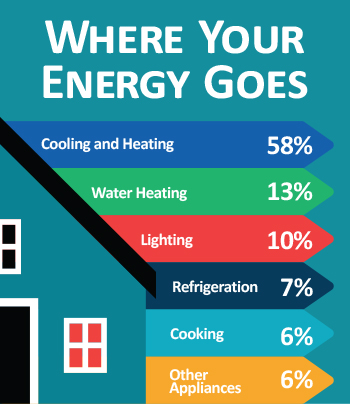Energy Saving Tips and Information
Tips to Conserve Energy & Save Money During Hot Weather
Taking simple actions like these during hot summer weather helps conserve energy and saves you money on your utility bill:
- Set your thermostat at 78 degrees or higher. Bump it up a little more if you are leaving home. Familiarize yourself with the 20 degree differential between outside and inside temperature. Maintain your air conditioning unit with seasonal tune ups and change filters monthly during the hot summer months.
- Use fans & point them in your direction to feel 4-6 degrees cooler. Set ceiling fans to run counter-clockwise.
- Lower window shades and blinds when they are in direct sunlight.
- Avoid using large appliances like an oven and clothes dryer. Grill & line dry when you can.
- Unplug appliances and electronics when you are not using them. When the wire is connected to the outlet it consumes energy, even if the appliance or device is turned off.
Ways to manage your energy:
Utilize the following to help take control of your energy use.
- Savings Programs - Go here to use an energy calculator, find upcoming events close to you, and more
- Login to Manage My Account where you can view your energy use, past bills and more
- Save through rebates through our energy saving and rebate programs
- Check out the tips below to help make your home more energy efficient
Simple and inexpensive actions to start saving in your home:
Here are some simple and inexpensive energy conservation actions you can take in your home throughout the year to help you save energy & save money on your utility bill.
It's important to stay safe all the time. Here are safety tips to remember year-round.
- Never use a stove or an oven as a space heater. Using the stove or range to heat your home can produce dangerous carbon monoxide gas.
- Test smoke alarms to verify they are working in every bedroom, outside each sleeping area, and on every floor.
- Test or install carbon monoxide alarms in a central location outside sleeping areas.
- Keep flammable liquids and spray cans at least three feet from heating equipment.
- When using a natural gas space heater, leave a window open a couple of inches for proper ventilation.
- Keep areas around your gas water heater or furnace clean, uncluttered, and free of flammable materials. Be sure your natural gas appliances are serviced and use a professional for needed repairs.
- Never use a generator in an enclosed space - Generator Safety
- For additional safety tips, please visit cpsenergy.com/safety.
Get help paying your high energy bill:
Extreme weather is the number one reason for high energy bills. We will work with you on a payment plan and we have customer assistance programs available.
- Conveniently apply online for a payment plan in Manage My Account (MMA)
- Log on to MMA
- Click on Discounts & Programs
- Click on Payment Plans
What are High Energy Demand days?
High energy demand days are a few days each summer, and sometimes during the winter, when demand for electricity is highest. Conserve energy every day, and especially on high energy demand days. Demand is typically at its highest in the summer between 2 p.m. and 7 p.m. on very hot days. High demand during the winter months occurs during the morning hours on cold days, but can be throughout the day when cold weather is extreme.
During extreme weather, pay attention to messaging from Electric Reliability Council of Texas (ERCOT), in the event they request reductions in electricity demand during certain hours. Download ERCOT's mobile app and follow ERCOT on Twitter @ERCOT_ISO to track electricity demand.
What steps can you take to conserve energy on high energy demand days during the summer?
- Set thermostats 2° to 3° higher from 2 p.m. to 7 p.m. Set programmable thermostats to higher temperatures when no one is home.
- If home, use fans to feel 4° to 6° cooler. Set ceiling fans to run counter-clockwise for cooling.
- Set pool pumps to run early morning or overnight & shut off from 2 p.m. to 7 p.m.
- Turn off and unplug non-essential lights and appliances.
- Avoid using large appliances (i.e. ovens, washing machines, clothes dryers, etc.), especially during peak demand hours or the hours specified in a conservation appeal.
- Businesses should minimize the use of electric lighting and electricity-consuming equipment as much as possible.
- Large consumers of electricity should consider shutting down or reducing non-essential production processes.
- Review the energy-saving tips for air conditioning, refrigerator & freezer, washer, dryer, dishwasher, electronics, and lighting.
